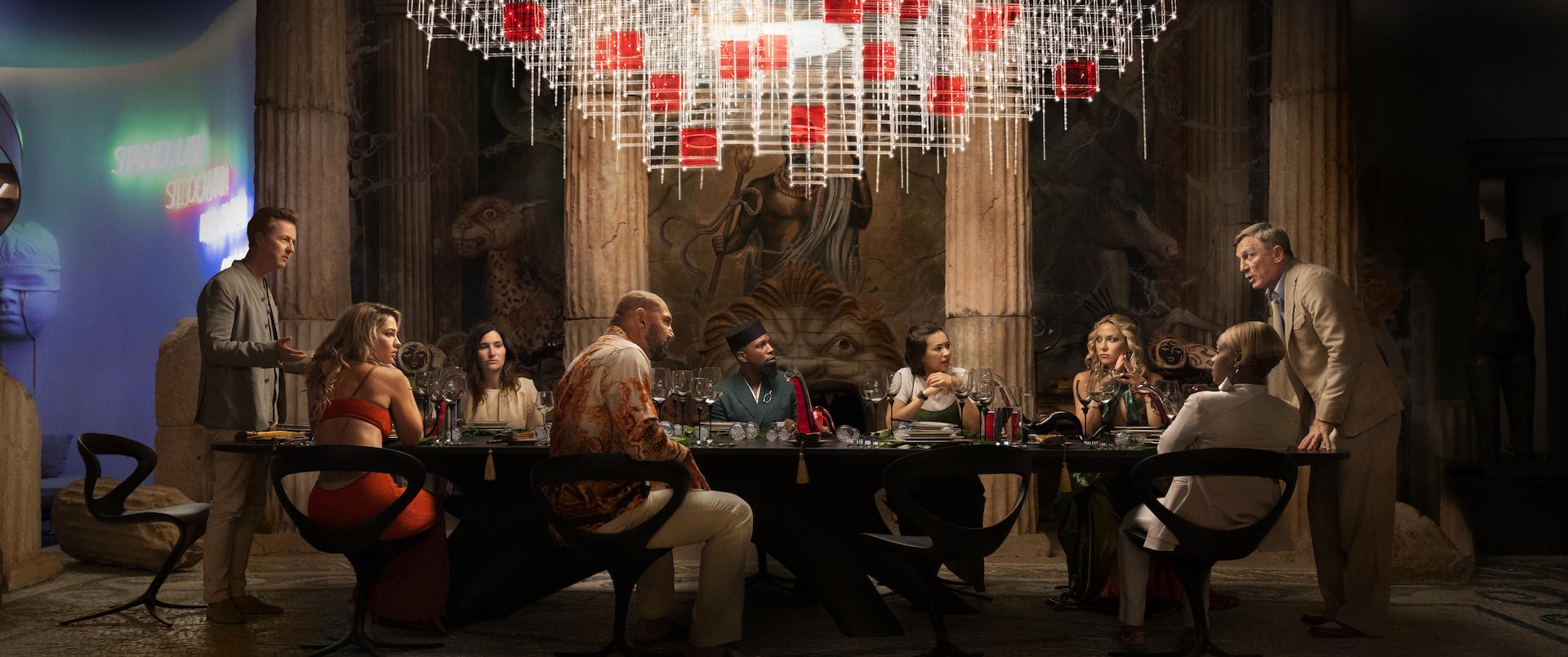By Barney Johnson, Third Year, Film and TV
Knives Out (2019) was a film of deceptively simple themes and largely satirical characters wrapped in an ever-contorting web of mistruths and misinterpretations. It served as a truly fresh and reinvigorating take on the whodunit genre which had prior been perceived by most as a film-type of cinema past. Glass Onion: A Knives Out Mystery very much affirms its own identity, separate from Knives Out, and further evidences director Rian Johnson’s affinity for the murder mystery genre, perhaps even exceeding his first attempt, which was already brilliant in its own right.
Knives Out focused primarily on a family of entitled upper-class cravens who all constantly attempted to undermine one another to satiate their own avarices, with them all persistently hoping to appease their affluent but difficult patriarch, Harlan Thrombey (Christopher Plummer). Glass Onion follows a similar vein of mostly despicable narcissistic socialites who once again latch on to their incomprehensibly wealthy and influential benefactor to whom they owe much of their financial and social status, the tech tycoon Miles Bron (Edward Norton).

As such, Glass Onion risks the outcome of coming across as derivative and unoriginal, but fortunately Johnson manages to escalate every element of the original film that made it such an already beloved modern classic; an even more boisterous and verbosely detestable cast than the last, with Kate Hudson’s tone-deaf fashionista Birdie and Dave Bautista’s men’s rights influencer Duke both being particular standouts and blatant but effective parallels to real contemporary celebrities whose awareness, morality and use of influence is dubious at best.
The only commonality in on-screen personnel between the two films is that of Daniel Craig, reprising his role as the lovably overstated detective Benoit Blanc, who has rapidly become one of Craig’s most entertaining roles with his ridiculously stylised monologues and absurd southern American accent. Craig excels perhaps even more so in his second outing as Detective Blanc, taking a more central role for most of the narrative as a hysterically oblivious fish out of water on Miles’ idyllic island where the cast are all assembled for a holiday of rekindling and hijinks.

Just like in Knives Out, Johnson manages to catch lightning in a bottle a second time with its subversively shrewd and reflexive screenplay, and watching all the established plot elements domino over one another in the final act of the film, like a sort of cinematic Rube Goldberg machine, is a delight to witness.
Glass Onion also accomplishes an even more unlikely and unpredictable protagonist, whose duplicitous emergence at the halfway point of the film makes the first act much more enthralling in retrospect, although I will keep their identity anonymous for those yet to watch.
As such, Johnson once again manages to convince the viewer they know what has happened and to believe what they have seen to be a single irrefutable fact, only to springboard a paradigm-shifting truth that completely alters our perception of the events we have seen unfold, as well as cranking our anticipation for how these components will ultimately amalgamate as we edge closer to its denouement.

Nathan Johnson, cousin of the director and writer of the film, composes a grand score that sounds familiar and majestic, yet devious and sonically Machiavellian, enhancing the already gorgeous sweeping establishing shots of the grandiose set that most of Glass Onion takes place on. The art design is characteristic of both Knives Out films and as such is becoming one of the most visually arresting staples of Johnson’s universe.
Glass Onion further epitomises Rian Johnson’s strongest traits as a filmmaker and writer, and while it follows an almost exclusively fresh ensemble cast from its predecessor, it coherently and charismatically maintains the quirky tone expected of it, but with an even more boastful array of eccentric sets and satirical characters.
Featured Image: Courtesy of IMDB
How would you compare Glass Onion: A Knives Out Mystery to the first film?








